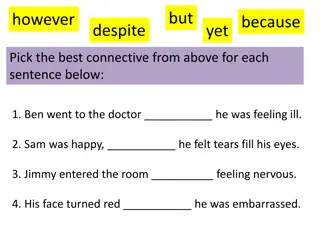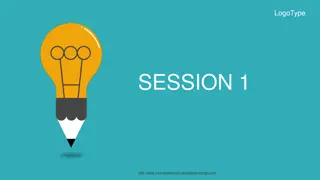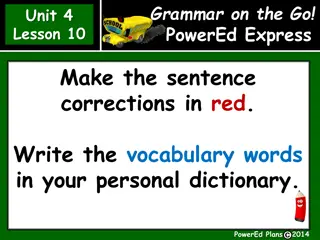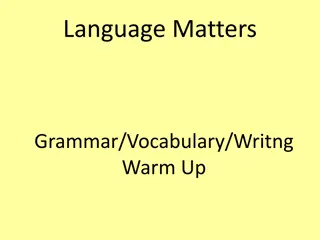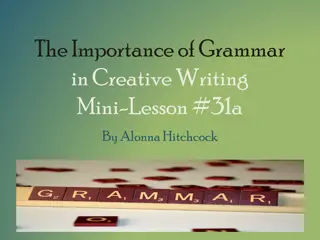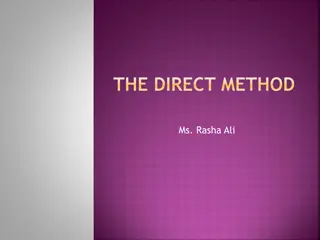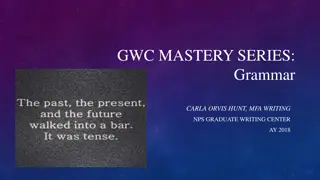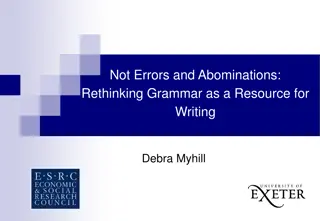Language and Grammar Practice Activities for Improved Writing Skills
Engage in various language and grammar practice activities, including a diagnostic test, partner correction exercises, and rewriting song lyrics to adhere to grammar rules. Enhance your skills with focused tasks and receive feedback to identify areas for improvement.
Download Presentation

Please find below an Image/Link to download the presentation.
The content on the website is provided AS IS for your information and personal use only. It may not be sold, licensed, or shared on other websites without obtaining consent from the author. Download presentation by click this link. If you encounter any issues during the download, it is possible that the publisher has removed the file from their server.
E N D
Presentation Transcript
Journal Monday, March 13
I-ready Bring headphones tomorrow
Grammar/Mechanics Diagnostic
Rank yourself: 1-5 (1=awful, 5=fantastic) 1. Capitalizing (start of sentences, Names/Titles, only what needs to be in caps) 2. Periods (at the end of sentences when needed) 3. Writing in complete sentences (subjects, verbs, etc) 4. Writing compound sentences (with commas and conjunctions) 5. Using quotation marks in sentences (for dialogue, textual evidence, etc. 6. Choosing the correct word (their, they re, there; it s, its; etc) 7. Using the correct subject-verb agreement 8. Using correct punctuation (colon, semi-colons)
Diagnostic -this will not be graded based on how many you answer correctly -you have 15 minutes ***This will help identify what you need to practice
Answers: Let s see how you did
Practice Work with ONE partner to correct the errors in the passage.
Lil Kodak they don't like to see you winnin' They wanna see you in the penitentiary I need me a lil' baby who gon' listen Girl, I don't wanna be the one you iggin' My mama told me, "Boy make a decision" Right now I gotta keep a tunnel vision They sendin' all my homies on a mission And I ain't tryna miss out on these millions Fix It Rewrite the lyrics to follow all grammar and writing rules. (If something isn t a real word, fix it.)
Journal Tuesday, March 14
Lil Kodak they don't like to see you winnin' They wanna see you in the penitentiary I need me a lil' baby who gon' listen Girl, I don't wanna be the one you iggin' My mama told me, "Boy make a decision" Right now I gotta keep a tunnel vision They sendin' all my homies on a mission And I ain't tryna miss out on these millions Fix It Rewrite the lyrics to follow all grammar and writing rules. (If something isn t a real word, fix it.)
Pronoun-Antecedent Agreement How do you know if they match?
Pronouns take the place of nouns. Mary went to the store. => She went to the store.
Subject pronouns are the subject of the sentence. Subject Pronouns I, you, he, she, it {They complete the action.} We, you, they
Object pronouns are the object of the sentence. Object Pronouns {They receive the action.} Me, you, him, her, it Us, you, them
Possessive Pronouns Possessive pronouns show ownership. My, mine, your, yours, his, hers, its {Something belongs to them} Our, ours, your, yours their, theirs,
Pronoun-Antecedent Rules: 1. A pronoun must agree with its antecedent in number, gender, and person. Singular: I, you, he, she Plural: we, you, they Gender: male or female
Pronoun-Antecedent Rules: A singular pronoun must correspond to a singular antecedent. The garbage man took away 25% more trash this holiday. He began dreaming of a green Christmas next year, one with less trash. A plural pronoun must refer to a plural antecedent. The garbage men worked hard. They wanted to go skiing in Colorado.
Pronoun-Antecedent Rules: Pronouns that refer to a male or female must refer to the correct gender. Fred drank milk before he ate dinner. Susan ate steak after she went home. Students may smirk at the seeming simplicity of this lesson. They ll stop smirking when they realize how many pronoun-antecedent agreement errors their own writing contains.
Pronoun-Antecedent Rules: He or She vs. They If the gender of a singular antecedent is unclear, you do not use they. Instead say he or she or his or hers The student failed the test. He or she failed the test.
Pronoun-Antecedent Rules: Indefinite Pronouns The indefinite pronouns below are ALWAYS singular. The indefinite pronouns below are ALWAYS plural.
Pronoun-Antecedent Rules: Indefinite Pronouns The indefinite pronouns below are dependent upon context.
Pronoun/Antecedent Agreement For 1-15, write the correct pronoun. Then, write the antecedent in parenthesis beside the pronoun. Example: 1. Claude s sisters sailed (her/their/hers) sailboat out on the bay. 1. their (sisters)
I know I'm probably better off on my own Than loving a man who Didn't know what he had when he had it And I see the permanent damage you did to me Never again, I just Wish I could forget when it was magic Fix It Rewrite the lyrics to follow all grammar and writing rules. I wish it wasn't 4 AM, standing in the mirror Saying to myself, you know you had to do it I know, the bravest thing I ever did was Run (If something isn t a real word, fix it.)
Journal Wednesday, March 15
Subject-Verb Agreement How do you know if they match?
Singular-Singular I am I was You are You were He/She is He/She was We are We were They are They were
Collective Nouns as Subjects A collective noun is one word that represents a group -class, team, jury, etc. The collective noun is singular when the group acts together. The jury is in agreement. The collective noun is plural when the group acts separately. The jury are undecided.
Practice: 1. Two of the passengers (was, were) demanding a refund for the cancelled flight. 2. Sara and Anna (likes, like) to eat ice cream with pretzels. 3. The lawn service (does, do) the weed eating on each visit. 4. (Have, Has) your parents given their permission for you to go to the beach? 5. The fireflies (was, were) lighting up the sky on the warm summer night.
Journal: Get out your papers for a practice quiz on subject-verb. Thursday, March 16
1. Many mistakes has been made in the past, but they can now be corrected. 2. Every musician have different tastes in music. Subject-Verb 3. Neither the flowers nor the gardenia bush are suffering any ill effects from the frost last week. Rewrite the sentences with the correct subject-verb agreement. 4. Nothing lasts forever. 5. None of the students knows the answer.
Colons and Semicolons Do you know how to use them?
Quotations Punctuation matters.
Dialogue-Conversation Write a creative piece that uses dialogue punctuated correctly. You need at least two people. Give them names. Do your work, said Ms. Justice. Mark replied, But I don t want to.
Journal Friday, March 17
Parallelism Keep it all the same
Parallelism To maintain parallelism, you must list items with equal grammatical structure. This means verbs should be in the same form, phrases/clauses should be written the same, and lists should contain the same part of speech.
It creates balance in writing. I have nothing to offer but bleeding, work, tears, and sweating. Parallelism AKA parallel structure and parallel syntax Or I have nothing to offer but blood, work, tears and sweat.
Parallelism Examples Good writing requires you to plan outlines, write several drafts, and revision. Good writing requires you to plan outlines, write several drafts, and revise your work
Practice: fix the sentence to create parallelism 1. Betty has intelligence, honesty, and she is funny. 2. This proposal is profitable, timely, and it helps us. 3. Many gases are invisible, odorless, and they have no taste. 4. Mr. Foster is not only an excellent barber but also sings well.
Reading or Independent Work Test next week
Journal March 20
Comma Review The most misused punctuation
Items in a series (list) Use commas to separate items in a list -He hates broccoli, mushrooms, and peas. -I have lived in Alabama, Georgia, South Carolina, and Florida.
Set off the not as important info (aka Nonessential or Appositive) Commas can help offset information that is not 100% needed in the sentence, but gives extra info. -She is, as you can probably tell, pretty nervous about public speaking. -Once upon a time, before television, before computers, people read books for fun.
Two Independent Clauses...with a conjunction Use commas to join two complete thoughts (can be a sentence) with a coordinating conjunction (FANBOYS) [commas go BEFORE the conjunction] -She want to the mall, and she bought a new pair of shoes. -You made an 80 on the test, but that was the highest score.
After the Introductory Info (dependent clause or word) Commas help offset additional information at the start of the sentence (think where you pause--first part is not a complete thought) -When I went running, I saw a duck. -Then, I will go to the store. -After you get home from school, you need to do your chores.






